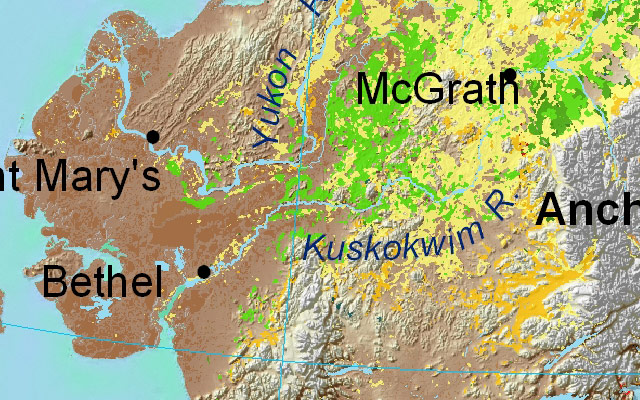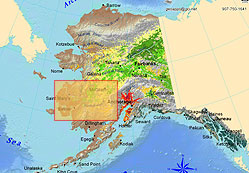Wood Availability
Firewood availability varies widely from region to region.
Click your area to see more detail and learn which fuel species are most readily available near you.


What you can expect to find:
Coastal communities in western Alaska will not generally have sufficient wood sources to heat with year round. However, institutional heat savings may be realized by shipping wood pellets or other processed wood material.Schools, public facilities and large building managers may consider alternative heating methods similar to those detailed in the Municipal Heating case studies »
Individuals further inland may find adequate supplies of white Spruce, black Spruce and in some cases Birch, which has more BTU's per cord than Spruce, may also be available.
Alaska Forest Dominant Tree Species by Forest Class
|
|||
Closed Broadleaf & Closed Mixed ForestBlack Cottonwood (Populus trichocarpa)Balsam Poplar Paper Birch Quaking Aspen White Spruce Black Spruce |
Closed Mixed ForestBlack Spruce (Picea mariana)Paper Birch (Betula papyrifera) White Spruce (Picea glauca) Balsam Poplar (Populus balsamifera) |
||
Closed Spruce ForestWhite SpruceBlack Spruce |
Spruce Woodland/ShrubWhite Spruce |
||
Open Spruce Forest/Shrub/BogWhite Spruce |
Spruce & Broadleaf ForestWhite SpruceBlack Spruce |
||
Open Spruce & Closed Mixed ForestWhite SpruceBlack Spruce Paper Birch Balsam Poplar Quaking Aspen (Populus tremuloides) |
Closed Spruce & Hemlock ForestSitka Spruce (Picea sitchensis)Western Hemlock (Tsuga heterophylla) |
||
|
|||
